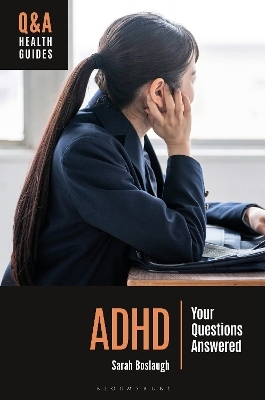
ADHD
Bloomsbury Academic (Verlag)
978-1-4408-8058-2 (ISBN)
Part of the Q&A Health Guides series, this book offers a broad introduction to attention-deficit/hyperactivity disorder (ADHD), one of the most prevalent yet also misunderstood and stigmatized neurodevelopmental conditions. The book’s 48 questions explore what ADHD is and who is most likely to be affected, common features of ADHD in both children and adults, which biological and environmental factors may contribute to ADHD, how ADHD is diagnosed and managed, and how those living with ADHD can reach their full potential. ADHD: Your Questions Answered addresses these and other topics in a way that both celebrates neurodiversity and acknowledges the many challenges that those with ADHD face.
Augmenting the main text, a collection of 5 case studies illustrate key concepts and issues through relatable stories and insightful recommendations. The Common Misconceptions section at the beginning of the volume dispels 5 long-standing myths about ADHD, directing readers to additional information in the text. The glossary defines terms that may be unfamiliar to readers, while the directory of resources curates a list of the most useful books, websites, and other materials. Finally, whether they’re looking for more information about this subject or any other health-related topic, readers can turn to the Guide to Health Literacy section for practical tools and strategies for finding, evaluating, and using credible sources of health information both on and off the internet.
Sarah Boslaugh is a statistician and public health expert. She holds a PhD from the City University of New York, USA, and an MPH from Saint Louis University, USA.
Series Foreword
Acknowledgements
Introduction
Guide to Health Literacy
Common Misconceptions about ADHD
1. Only children can have ADHD
2. Only boys can have ADHD
3. ADHD can only be controlled through medication
4. People with ADHD can’t succeed in school, work, or life
5. People with ADHD just need to try harder
Questions and Answers
The Basics
1. What is ADHD, and are there different types?
2. How prevalent is ADHD, and is it becoming more common?
3. Who is diagnosed with ADHD?
4. What are some risk factors for ADHD?
5. Do the brains of people with ADHD differ from the brains of people without the condition?
6. Is there a genetic component to ADHD?
7. Is there a link between vaccines and ADHD?
8. What are some diseases and conditions that commonly co-occur with ADHD?
9. Why do some people think ADHD isn’t a real condition?
Characteristics of ADHD
10. What are the most common symptoms of ADHD?
11. Does ADHD present differently in males and females?
12. Does ADHD present differently in children and adults?
13. What are the executive functions and how do they relate to ADHD?
14. What is hyperfocus and how does it relate to ADHD?
15. What is subthreshold ADHD?
16. Are there links between diet and ADHD?
17. Can ADHD symptoms be affected by factors like stress or lack of sleep?
18. What are the risks of ignoring ADHD symptoms?
19. Are there other conditions that have similar characteristics to ADHD?
Diagnosing and Managing ADHD
20. How is ADHD diagnosed?
21. What are some common drug treatments for ADHD?
22. What are some common side effects of ADHD drugs, and can anything be done about them?
23. Are there any foods that can interfere with ADHD treatments?
24. Why are stimulants used to treat a condition that has “hyperactivity” in its name?
25. I took my friend’s ADHD medication and did really well on an exam—does that mean I have ADHD?
26. What are some common behavioral treatments for ADHD?
27. Are there any alternative medicine treatments that can help with ADHD?
28. Is talk therapy useful for ADHD?
29. Does health insurance cover ADHD treatments?
30. Can ADHD be cured?
31. I take prescription medications for ADHD. Will I have to take them for my entire life?
32. What can I do if my prescribed treatment is not working?
33. What is a “drug holiday,” and why are they sometimes recommended?
Living with ADHD
34. Should I tell anyone at my school that I have ADHD?
35. What accommodations can be requested for students with ADHD, and how can I request them?
36. I’m a student with ADHD—what can I do to help myself excel academically?
37. What are some good career paths for people with ADHD?
38. Should I tell my employer I have ADHD?
39. What are some tips to help people with ADHD thrive in the workplace?
40. Can people with ADHD play sports?
41. I want to join the military—is that possible if I have ADHD?
42. What are some common social problems for people with ADHD?
43. How can ADHD impact romantic relationships?
44. What does it mean to self-medicate, and why might it be harmful?
45. There are people in my life that don’t believe ADHD is real. How can I help them understand that it is a legitimate condition and how it affects me?
46. Where can I find support to help me deal with ADHD?
47. Are there advantages to having ADHD?
Case Studies
Case 1: Sam is Struggling in Third Grade and Doesn’t Understand Why
Case 2: Wang is Having Social Adjustment Problems during Her Freshman Year at College
Case 3: Juan is Worried about Performing Well at His First Professional Job
Case 4: Ashley is Apprehensive about Taking a Drug Holiday
Case 5: Jordan’s Parents Don’t Believe ADHD is Real
Glossary
Directory of Resources
Index
| Erscheinungsdatum | 26.08.2024 |
|---|---|
| Reihe/Serie | Q&A Health Guides |
| Verlagsort | London |
| Sprache | englisch |
| Maße | 156 x 235 mm |
| Themenwelt | Sachbuch/Ratgeber ► Gesundheit / Leben / Psychologie ► Krankheiten / Heilverfahren |
| Sachbuch/Ratgeber ► Gesundheit / Leben / Psychologie ► Lebenshilfe / Lebensführung | |
| Kinder- / Jugendbuch ► Sachbücher | |
| Geisteswissenschaften ► Psychologie ► Persönlichkeitsstörungen | |
| Sozialwissenschaften ► Soziologie | |
| ISBN-10 | 1-4408-8058-1 / 1440880581 |
| ISBN-13 | 978-1-4408-8058-2 / 9781440880582 |
| Zustand | Neuware |
| Haben Sie eine Frage zum Produkt? |
aus dem Bereich


